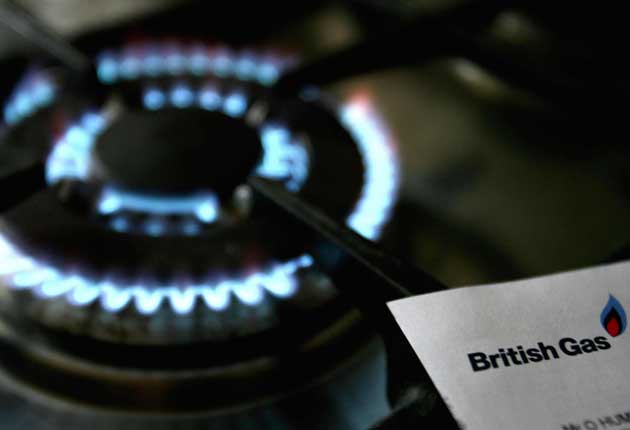Consuming Ideas: Bill estimates? We don't need them

Thump. The fuel bill lands on the doormat, telling you, in its own almost unfathomable way, how much gas and electricity you've used. Rather, your supplier has guessed your consumption by "estimating" your bill, because you were out when the meter reader called, or they didn't send one.
Can you think of any other industry where this happens? Does the phone company call and say: "We're going to charge you £250 this quarter, because we know you like a natter"; does the checkout assistant at the supermarket suck in her breath and say: "Ooh, looks like about £60 to me."
If the figure appears too large, you (the customer) has to check the ancient whirring meter and call the company – at your own expense – listen to a disembodied voice and slowly tap in the correct reading. Then the supplier issues a new bill.
If you're wondering whether there is an alternative to this imprecision and tedium, you would be right. New meters, updated with mobile phone-like transmitters, can constantly monitor fuel consumption and relay data to the supplier around the clock.
Followers of The Independent's "Great Energy Rip-Off" campaign may not be surprised to learn that the Big Six suppliers, the ones milking low wholesale prices, have installed "smart" meters in fewer than one per cent of British homes. But the likelihood is that you will have one fitted in the next few years after ministers (not the Big Six) belatedly woke up to their benefits. Because, in addition to the simple virtue of getting bills right, smart meters have another advantage: they improve energy efficiency and cut bills. People can easily see the cost of leaving lights on and switch them off.
The extent of the potential savings is unclear, but we should know soon. The regulator, Ofgem, has set up a trial in 59,000 homes of combinations of three environmental aids – posted information on consumption, clip-on digital displays and smart meters.
In interim findings last month, Ofgem said that among the 17,000 smart meter customers who also received posted data about energy use, bills fell.
The report concluded: "In general, there has been good feedback about the smart meter trials, including positive comments about billing accuracy, reduced need for meter reads and improved ability to track household energy consumption."
Funnily enough, a new supplier – First:utility, which is cheaper than the Big Six – is keen on smart meters. In fact, 80 per cent of First:utility's customers already have them. The company rents them from OnStream, a subsidiary of the National Grid, which fits them to homes.
Get a free fractional share worth up to £100.
Capital at risk.
Terms and conditions apply.
ADVERTISEMENT
Get a free fractional share worth up to £100.
Capital at risk.
Terms and conditions apply.
ADVERTISEMENT
Surely, I asked director Darren Braham, it's cheaper for a small supplier like his to pay for meter readings than to rent £80 smart meters?
Not so, according to Mr Braham. Apparently, the new meters are cheaper because as well as saving on meter readings, fewer customers contact the company to correct estimates. "I think 80 per cent of the calls the Big Six get about billing are about estimates, so they get a lot of calls and then they have to review the bill," said Mr Braham, who has a background in the telecoms industry.
Back to the Government. In May, Ed Miliband, the energy minister, promised that all 26 million electricity customers and all 22 million gas customers would have smart meters by 2010, at a cost – rather, an estimate – of £7bn. He wants the energy companies to fund their roll-out.
The Conservatives, too, want universal smart meters. Greg Clark the shadow energy minister, promised so in a speech to their party conference in which he referred to existing meters as "dumb metal wheels spinning in the garage that Thomas Edison would recognise"; but he declined to set a date.
Around the world, progress on smart meters is mixed. Italy, the acknowledged leader, installed them in 27 million homes between 2000 and 2005; California has put them in nine million homes; and there are eight million across Scandinavia. The Dutch have promised they will be in all homes by 2013, but the French and Germans are lagging.
So, it's time for a guess of your own: what are the chances of Britain becoming a world leader?
Heroes & Villains
Hero: Polaroid
After collapsing last year, Polaroid is back in business and plans to start selling instant film again by the middle of next year. While there are many benefits to the digital age, sometimes it's nice to hold on to something physical, like a Polaroid picture or an LP album. By allowing photographers to produce instant pictures, Polaroid was ahead of the times for decades. Now, engagingly, it's behind them. What next? A Teasmade? Yes, curiously, the bedside teamaker is coming back too, courtesy of John Lewis. Surely something that kitsch should be in the kitchen, but I suppose that would miss the point.
Villain: Danone
Danone "misled" the public by suggesting its probiotic drink Actimel improved children's health, the Advertising Standards Authority ruled this week. The French dairy giant's claim that the drink was "scientifically proven to help support your kids' defences" had not been categorically proved, the ASA ruled, despite Danone's submission of 23 human studies involving more than 6,000 yogurt-drinkers. Earlier this month the European Food Safety Authority (Efsa) dismissed 170 different health claims for probiotic ingredients. Efsa will assess Actimel shortly.
Join our commenting forum
Join thought-provoking conversations, follow other Independent readers and see their replies
Comments
Bookmark popover
Removed from bookmarks